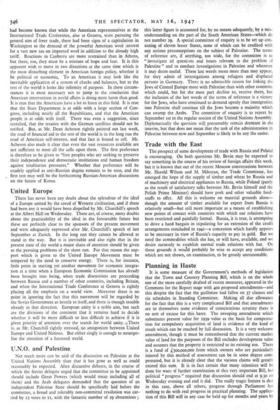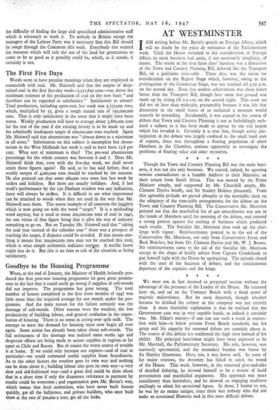Planning in Haste
It is some measure of the Government's methods of legislation that the Town and Country Planning Bill, which is on the whole one of the more carefully drafted of recent measures, appeared in the Commons for the Report stage .with 40o proposed amendments—and this despite the fact that the guillotine had fallen on 37 clauses and six schedules in Standing Committee. Making all due allowance for the fact that this is a very complicated Bill and that amendments are in themselves some evidence of conscientious scrutiny there is no sort of excuse for this haste. The sweeping amendment which substitutes present value for 1939 value as the basis for compensa- tion for compulsory acquisition of land is evidence of the kind of result which can be reached by full discussion. It is a very welcome amendment, though it must be remembered that the current market value of land for the purposes of the Bill excludes development value and assumes that the property is restricted to its existing use. There is a fund of k30o,00o,0oo from which owners who are particularly injured by this method of assessment can be in some degree com- pensated, but it is already clear that the various claims will greatly exceed this sum. It is in fact Certain that many injustices will be done for want of further examination of this very important Bill, but political " progress " required that discussion should end at 9.3o on Wednesday evening and end it did. The really tragic feature is that in this case, above all others, progress through Parliament has nothing to do with real progress in practical planning. The applica- tion of this Bill will in any case be held up for months and years by
the difficulty of finding the large and specialised administrative staff which is necessary to work it. To nobody in Britain except the managers of the Labour Party was it necessary that this Bill should be swept through the Commons this week. Everybody else wanted the measure which will rule the use of the land for generations to come to be as good as it possibly could be, which, as it stands, it certainly is not.



































 Previous page
Previous page